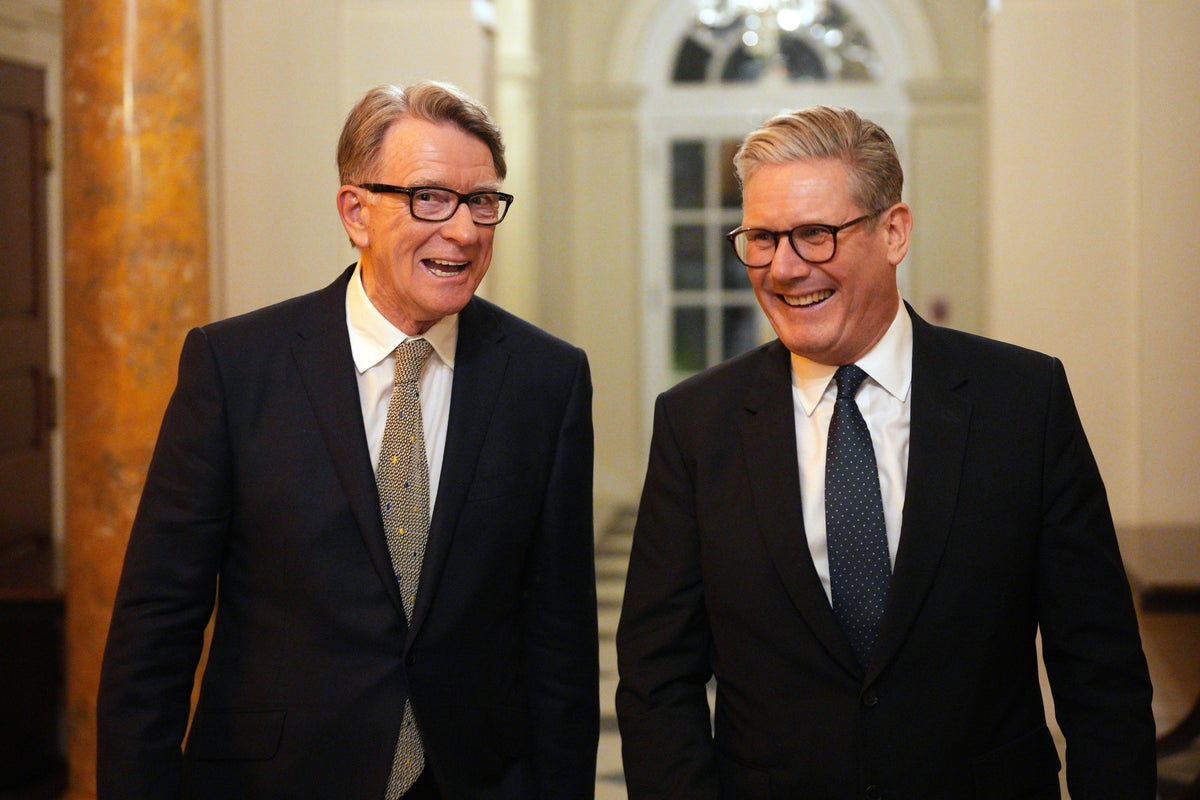Peter Mandelson achieved much for Labour and the governments he served in, and, without being pompous, for the British people. He was a key figure in saving his party in the 1980s, an outstanding EU trade envoy, too, and was already plainly a skilful ambassador in Washington. He was usually well-respected by those he worked with and, for some leaders of his party, regarded as indispensable.
His gifts are considerable – but so, evidently, are his flaws. He will carry with him for the rest of his life the shame – there is no better word for it – that he was advising Jeffrey Epstein on “strategy” and urging him on in his plea bargaining for a reduced prison sentence on the charge of procuring a minor for prostitution. Keir Starmer was right to sack him.
This goes way beyond being just another member of Epstein’s circle. Mandelson should have known that supporting Epstein was wrong and unforgivable, and he should, at that point, if not long before, severed his links with the paedophile. Instead, he was reassuring him by email that “your friends stay with you and love you”. The sycophancy in their exchanges, most graphically in Mandelson’s ten-page handwritten contribution to the “birthday book” for Epstein, organised by Ghislaine Maxwell, is disturbing to say the least.
How did Mandelson place himself in such a position? One of the more revealing, not to say tawdry, exchanges between him and Epstein occurred just before noon on October 27 2005. It tells us, I think, a lot about the supposed “friendship” between the two men, as well as about Mandelson’s apparent fascination with wealth, his own and other people’s (which were sometimes linked).
To give a little context, he’d stood down from the Commons at the 2005 general election and had been kicking around the backbenches for some time, having had to resign from the Blair government for a second time in 2001. This was over a scandal in which he was accused of using undue influence to obtain British passports for the Hinduja brothers, unbelievably rich men with considerable British business interests.
Mandelson had, since the previous November, been European Union Commissioner for Trade, to which post Blair had nominated him. On that fairly cool, grey morning in Belgium, Peter’s mind turned to a warmer prospect, writing: “When are you going to the island at Xmas? I am having trouble getting air tickets to st barts and was wondering about going via US, NY or Miami (but this may also be difficult because of availability of BA airmiles).
“What are your plans and do I fit in to them ?”
Quite a brusque sort of communication to his “best pal”, that, but maybe both men preferred to get to the point. It looks like a fairly blatant attempt to get his “friend” Epstein to pay for his flight out to Epstein’s now infamous private islet in the US Virgin Islands. I’m guessing it would have included Mandelson’s partner and now husband.
Having never enjoyed the “friendship” of such a fabulously monied man as Epstein, I’m not in a position to say whether this is “the done thing” in such circles or not, but I don’t think I’d ever ask one of my friends to pay for a flight to see them, or even for the bus fare. Nor would they sub me.
Mandelson, by this point, was not a poor man, and could probably have used his precious British Airways air miles, or his own cash, to pay for his passage, which, after all was accompanied by free board and lodging, use of the luxury facilities, fine dining (“yum, yum”) and conversation with other “interesting”, well-connected and, of course, loaded guests.
It’s all very tawdry, let’s face it, and it seems that Epstein’s network of “friends” simply constituted a networking club of the rich and famous, where the members knew each other in some vaguely professional sense, but were not motivated by any real affection or bonds of loyalty. They – Clinton, Gates, Trump, Prince Andrew, Mandelson among them – were all in Epstein and Maxwell’s extended group for what they could get out of it.
This nexus of influence, money and power is how Andrew, in his car-crash 2019 Newsnight interview, tried to defend at least his early involvement in Epstein’s circle.
He said: “It would be a considerable stretch to say that he was a very, very close friend. But he had the most extraordinary ability to bring extraordinary people together, and that’s the bit that I remember as going to the dinner parties where you would meet academics, politicians, people from the United Nations. It was a cosmopolitan group of what I would describe as US eminents.”
As for Mandelson, who can really say who was using whom between him and Epstein, but it looks like there were free holidays as a benefit-in-kind for whatever Mandelson was useful for. The tragedy of Peter Mandelson, if that’s not too kind a perspective, is that he was constantly brought down by money. The first resignation from government came only months into his time as a minister in the new Blair government, when it emerged that he’d received undeclared financial assistance from Geoffrey Robinson, another minister and a rich businessman, to buy a nice house in Notting Hill befitting his (Mandelson’s) social status.
Then there was the second resignation, when he got tangled up with the billionaire Hundujas, and now his association with Epstein has finally caught up with him. Perhaps things could have been different, but the record suggests that Mandelson is just one of those people who has his uses, but is usually trouble. Keir Starmer is only the latest person to find out just how destructive he can be.

